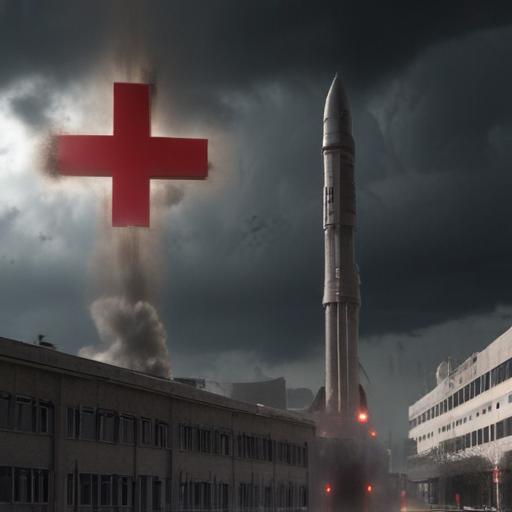An Iranian missile struck Soroka Medical Center, one of Israel’s largest hospitals in Beersheba, early Thursday morning, causing significant damage, minor injuries, and triggering calls for retaliation from Israeli officials. The missile hit the surgery department shortly after 7 a.m., igniting a fire and breaking windows throughout the facility. Approximately 80 individuals, mostly injured by glass and debris, were treated for their injuries. Fortunately, the impacted area had been evacuated prior to the attack, preventing more serious casualties.
Eyewitness reports from Dr. Joseph Kushnir described the scene as chaotic, with thick smoke rising from the hospital following the explosion. At the time of the strike, around 700 patients were in the hospital, a number that has since decreased to approximately 300.
Iranian news agency IRNA claimed that the missile strike aimed not only at the hospital but also targeted Israel Defense Forces facilities in the Gav-Yam Negev Advanced Technologies Park, which is close to the hospital. Recent reports suggest that the Israeli military has been relocating thousands of soldiers to a newly constructed hub near this area, raising concerns about the potential for further escalation.
In addition to the hospital attack, missiles struck residential areas in Ramat Gan and Holon, injuring dozens. The Israeli military’s Home Front Command has warned civilians to be cautious about unexploded ordnance resulting from the attacks, which included the use of cluster munitions.
Israeli leaders condemned the missile attack as evidence of Iran’s disregard for civilian lives. Prime Minister Benjamin Netanyahu and Defense Minister Israel Katz both emphasized the need for intensified strikes against Iranian military targets as retribution. Katz highlighted that Iran’s supreme leader would be held accountable for the attack.
The ongoing conflict has raised serious humanitarian concerns, especially with international criticism aimed at Israel’s military tactics, including strikes that have allegedly resulted in civilian casualties and damaged medical facilities in regions like Gaza. In a related military operation, Israeli forces struck Iran’s Khondab heavy water research reactor and other nuclear-related sites near Tehran, citing ongoing efforts to diminish Iran’s military capabilities.
While military engagements continue, international diplomatic efforts are underway, with world leaders urging de-escalation and a return to negotiations. Iranian officials have indicated a willingness to resume talks under the condition of a ceasefire, presenting a glimmer of hope for peace amid ongoing hostilities.
The situation remains fluid, and its implications for regional stability are profound, as the conflict’s dynamics could further evolve in response to military actions and diplomatic initiatives.
